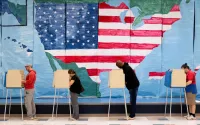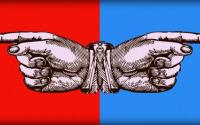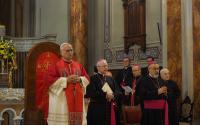Can war be avoided? Talk about it hereIraq: Observer special
Euan FergusonSeptember 29, 2002
It was nice to see things back to normal. There were reports, after last Sunday's countryside march, that the police, for the first time in history, had agreed with the organisers about the number of marchers. Yesterday afternoon, as London limped to a halt because of the massive anti-war/pro-Palestine peace march, we were back in happy and familiar territory: 'He only fell down the three steps.' 'What bruise?'
Scotland Yard said at 2pm that perhaps 40,000 demonstrators had turned up. I was halfway along Piccadilly at the time, at the head of the march, phoning a friend at the back, in a crush at the Embankment, and she hadn't even started moving. The Stop the War coalition last night claimed the total was more than 350,000; the police reluctantly moved up from 'four men with beards and a small dog' to 150,000, and the truth was, if anything, even higher than either, given the number of Londoners slipping in and out of the stream before sliding off to shops and pubs. It was a big, big, important march, and quite angry, and quite mixed.
'It doesn't say anything obscene, does it?' asked the mounted copper, in fairly friendly fashion at 1pm, as Torron Urquhart unfurled a banner in Arabic, held it up before the horse and asked his friend to take a picture. It said 'Saudi Arabia against war' - at least, it did according to Torron; it could quite easily have been impugning the rider-horse relationship. The march began in this fashion, languages and cultures fusing all over the place, yet together in their aim, for there was an undeniable unity of purpose. Everyone to whom I spoke conjoined both aims: to stop the war and to act to help Palestine: angry Muslims in PLO gear, tidy Hampstead ladies with their granddaughters in prams, a welter of students with the pallor and spectacles you get from months of small print in low light. 'You can't separate them out,' said Sharon Finmark, who is Jewish. 'Unless the Middle East conflict is solved, going into Iraq is just going to make the whole area explode,' and this same message came across time and again, endlessly. It's not just about Iraq. It's the tinderbox, stupid.
It was back to the old days, too, in terms of types. All the oldies and goodies were there. The Socialist Workers' Party, leafleting outside Temple Tube station by 11 am. ('In this edition: Noam Chomsky in Socialist Worker !'). CND, and ex-Services CND. The Scottish Socialist Party. 'Scarborough Against War and Globalisation', which has a lovely ring of optimism to it, recalling the famous Irish provincial leader column in 1939: 'Let Herr Hitler be warned, the eyes of the Skibereen Eagle are upon him.' Many, many Muslim groups, and most containing women and children, although some uneasy thoughts pass through your mind when you see a line of pretty six-year-old black-clad Muslim toddlers walking ahead of the megaphone chanting 'George Bush, we know you/Daddy was a killer too,' and singing about Sharon and Hitler.
All the groups, the old Left and the new radical worried world of Islam, merged for the most part very easily, although there was an altercation at one point when the organisers tried to persuade a group of young Palestinians to go to the very back of the march, or preferably go home, but at least take off the official march T-shirt; for some reason they objected to the youths' having strapped fake stacks of suicide-bombers' dyna mite across their chests. They changed their T-shirts.
Tony Blair got a bit of a kicking again, for the second week in a row, but the knives were out in particular for George W. Bush. According to organiser Andrew Burgin, the two leaders had simply used allegations that Saddam Hussein has weapons of mass destruction as an excuse to fight a war that was about getting a more generous deal on oil in the region.
'We think there's no real evidence that Iraq has weapons of mass destruction, and even so we don't think that's the real reason for the attacks. The real reason for the attacks is oil,' he said. There was total agreement on the march; not one person seemed in any way convinced that last week's dossier proved any increased threat.
The march went reasonably peacefully, sometimes musically, from Embankment to the Houses of Parliament, right up Whitehall, past the statues commemorating Britain's many glorious and inglorious campaigns of old, and along Piccadilly, blocking traffic and spilling on to the footpaths, the leaders reaching Hyde Park around three o'clock, in time to hear Tony Benn's speech being drowned out by the clatter of the overhead helicopter. One of the most prominent posters bobbing through the gates, along with the more usual 'Stop the bloody war' and 'Regime change in Britain', and the slightly less usual 'Urban 75 Baby Eating Anarchists', was that of the Iraqi Communist Party, demanding 'No to war; No to Saddam dictatorship'; it hadn't been that obvious, before, that the ICP was simply the overseas branch of our own dear Lib Dems.
Political unity, then, but a march not entirely free of contradictions. In Hyde Park itself, as the hundreds of thousands filed through to lie in the sunshine and chat with old friends - many were veterans of marches from the miners' strike on, but this was the biggest any had seen - one young man was selling T-shirts, bawling through his megaphone, drowning out the group nearby begging for £1 to save the life of one Palestinian child.
'Get your T-shirts here! Say No to War! Say No to Blair's global imperialism! Say No to Capitalism! Only £10!' Nice to see things back to normal.






